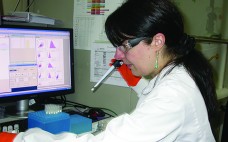Cells have become essential in modern medicine as therapies, vehicles for producing high‑value therapeutics, and tools for high‑throughput screening of pharmaceutical compounds. In the latter area, more than 50% of drug discovery screens use cell‑based assays, predominantly targeting receptors and ion channels using fluorescence‑based measurements, in either or both high‑ throughput and high‑content formats (1). Alongside a cell therapy market estimated to be worth some $5.0 billion by 2015 (2), the larger cell‑ based screening market is estimated to be…
Wednesday, September 23, 2015 Daily Archives
Development of a High-Throughput Formulation Screening Platform for Monoclonal Antibodies
The goal of formulation development for therapeutic proteins is to find conditions under which a protein remains stable during storage, transport, and delivery to patients. Both chemical and physical stability must be considered. Chemical stability is related to the rates of chemical modification to a protein molecule such as deamidation of aspargine residues and oxidation of methionine residues (1, 2). Particularly important to control if they affect biological function, those modifications could also lead to changes in conformation or half-life…
Fluid Dynamics of a Single-Use, Stirred-Tank Bioreactor for Mammalian Cell Culture
The benefits of single-use technologies in both upstream and downstream operations are now widely acknowledged by the biopharmaceutical industry, and have led to radical changes in the design and operation of many bioprocesses. Those changes typically provide more robust processes and increased production flexibility. For mammalian cell culture, cleanable multiuse glass or stainless steel stirred-tank reactors (STRs) have been used successfully for growth of suspension-adapted cell lines in both small- and large-scale systems. However, achieving the same or better performance…
Elucidation: The Medical Products Industry Must Resist the Pharmaphobes
I often ask people: “Do you think medical practice is better, worse, or the same compared with what it was when I graduated from medical school nearly 50 years ago?” The most common answer is “I guess it’s somewhat better,” although some say “Worse!” I explain that the unequivocal right answer is “hugely better!” For example, our average lifespan is now a decade longer, and we suffer far less from incapacitating diseases such as arthritis. Then I ask, “Why are…



